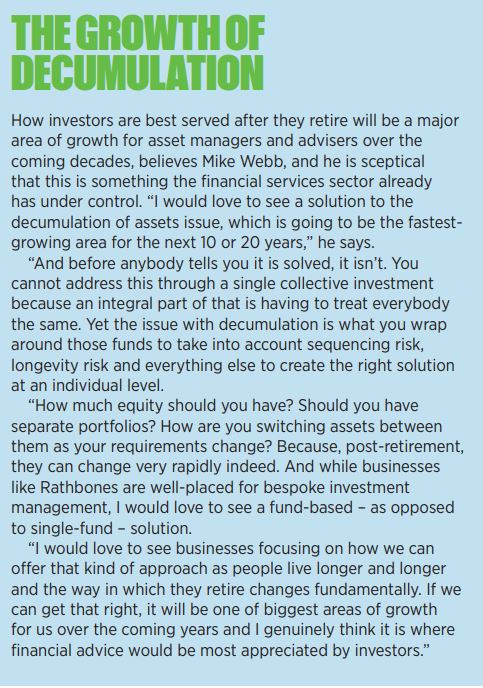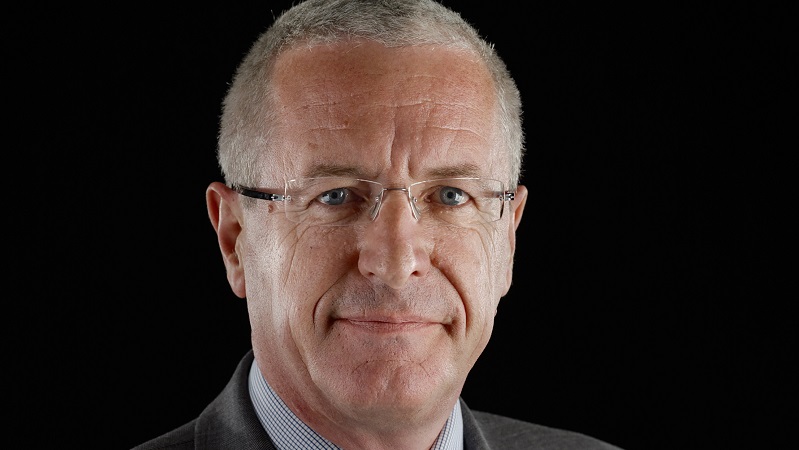Should fund groups be lobbying Netflix to commission a financial follow-up to its hit comedy drama Sex Education? The thought occurs as Rathbone Unit Trust Management chief executive officer Mike Webb makes the argument the future of asset management, advice and the broader financial services sector is inextricably tied up with end-investors becoming better educated around their financial circumstances.
“Of course, part of the responsibility for that lies with asset managers, with financial advisers, with any provider talking to an end-investor,” acknowledges Webb, who joined Rathbones exactly a decade ago and whose 35-plus years in asset management has also taken in senior roles at Hermes, Invesco Perpetual, GT Global, Prolific and Hambros.
“We cannot properly succeed, however, without there being some form of financial education at a much lower age. We have sex education in schools so, if we are going to teach people not to get pregnant when they are 14, why can’t we teach them how to manage their finances? We need to begin talking about money much earlier so the conversations we have about it later in life become much clearer.”
As he goes on to do more than once in our conversation, Webb turns to the regulatory environment in which asset managers are now operating. “While I absolutely applaud the drive towards transparency of charges, the calculation of implicit and explicit trading costs is an example of something that will ultimately only serve to confuse an end-investor,” he says.
“Why are we producing information at a level that is designed for media commentators and professional analysts? It makes it almost impossible not to confuse the hell out of consumers. We need to rethink that, and identify the information that would help an investor understand what it is they are buying without going too deep under the bonnet.”
Since he raises the subject of cost, what does Webb believe constitutes ‘value for money’ in asset management? In addressing the question, he focuses very much on the first word, bolstering his argument with reference to the stipulation by the Financial Conduct Authority (FCA) that asset managers now publish an annual ‘assessment of value’.
“Notice it’s not called an ‘assessment of value for money’,” he continues. “That is really important because, at the moment, everybody seems focused on cost, and, of course, value does not necessarily represent that. Within the value statements we are publishing for a number of our funds, for example, we have looked at nine different criteria, including continuing to invest in Rathbones as a whole.
“In other words, are we offering value if we have to cut back our investment into the business, not only in terms of the services it offers but also its future financial stability? That is hardly something that directly involves an end-investor in one of our funds but, trust me, it makes a big difference overall because I have to be able to attract and retain the best-quality talent. It is not simply down to individual fund franchises.
“Value statements are a great idea because they have forced boards to think hard about whether funds are really fit for purpose. My fear, though, is some people will try and see them as a guarantee of the future, and that must not happen. We would argue what constitutes ‘value’ is a decent outcome for the end-investor, over a period for which we have created an expectation, subject to any explosion in markets.
“Yes, performance is a critical factor but, if you look back at the financial crisis, did all equity funds cease to offer value? Of course not. Investors should have in mind a minimum return and time horizon, and an expectation that, in normal markets, we should meet or exceed those. Then, if there is major market turmoil, our job is to explain why that has happened and what it means looking forward.”

Regulators need to understand the pace of change
Despite his endorsement of the assessment of value, Webb has wider concerns about financial regulation. “The regulators need to understand the pace of change and what they are requiring businesses to do or they risk not ultimately achieving the results they want,” he says. “I mean, do I believe in transparency, better governance, being more accountable for what you do and so on? Of course I do – who wouldn’t?
“But all the UK and European legislation we have had to integrate in the last few years doesn’t leave much room for anything else. Few businesses have been able to spend any time at all looking at, for example, where they can most effectively invest in technology. They have been too busy collating, say, the past three years’ worth of transaction data on implicit and explicit costs.
“As a wealth management business – and remember, Rathbones is broader than just the asset manager – we are really interested in technology as financial services as a whole has tended to be behind the curve here. So we should be looking at how we can enhance – not replace – our client relationships by digitising the experience. Take opening an account, which is a very clunky thing to do. It takes time and costs a lot.
“If we can use biometric information to meet anti-money laundering rules, say, rather than pushing paper around, not only does it benefit the client by making their experience a bit better, it makes us massively more efficient, it creates capacity and it allows people on our wealth management side, for instance, to focus on using that information to improve their relationship with the end-investor.”
The media is right to put a spotlight on asset management
Turning to governance and liquidity, Webb argues that – notwithstanding their topicality – these are hardly issues on which asset managers should only now be focusing their attention. “We may have enhanced some of our liquidity reporting but we monitor it on a monthly basis anyway,” he adds. “Remember, the current focus on liquidity stems from a daily-traded fund with a mismatch of underlying assets, and we try not to do that.
“We never push the boundaries of what we can and cannot do, it’s just not worth it. It doesn’t add enough value to investors. Still, a combination of the asset management market study, the issues at Woodford and so on have made us focus more on likely liquidity requirements, so understanding not just a fund’s underlying assets but also its investor base and the likelihood of a run on the assets.”
Pressed on how the issues at Woodford Investment Management may have affected investor perceptions of the asset management sector, Webb suggests it may be more a question of how the episode has encouraged the media to be even more sceptical in their views. “They have always been relatively so, as is their job,” he says. “The point is, it was an exceptional moment but those do happen and we need to react in a very positive way.
“Clearly, without appropriate governance things can start to go wrong, so the media is right to put a spotlight on asset management. As for investors, however, we have not heard anything particularly concerning. The bottom line is a collective investment scheme remains simply the best way – if you do not have a lot of money – to gain exposure to assets that will drive above-inflation returns over a long period of time.”
On the not-unrelated matter of corporate culture, Webb says: “The regulator has a view that culture is incredibly important – as do I – but it tends to measure that through metrics such as complaints and governance. Yet culture is obviously a lot more than that. It is how your staff react to issues that arise. Is their first thought: what does this mean for me? Or for the company? Or for our investors?
“The first reaction of most people in asset management is what it means for investors, and I get nervous of companies that don’t think that way. If you want to boil culture down to its essence, it is how do people react when something happens that raises a conflict between the business, its shareholder, its employees and its customers? And if the first thing they think about is the customer, then you probably have a good culture.”

Rathbones got in early on risk-managed portfolios
Historically, collective investment funds have traditionally focused on equities and bonds, but to what extent should asset managers and their clients now be considering other asset classes? Here, Webb’s thinking is strongly influenced by the years immediately following the financial crisis. “After 2008, my concern was that we had lost another generation of investors,” he says.
“The experience of people who have been tempted to invest in the latest fad or hot performer is that they bought at the top and sold at the bottom. So one of the things I did when I arrived at Rathbones was to build up our risk-managed multi-asset portfolios. For quite a while, we were talking about this and not seeing a lot of interest but now we know it’s mainstream.
“These funds really speak to the FCA’s suitability regime, which focuses on outcomes for investors, and they don’t just look at equities and bonds. They are looking at diversifiers, by which I mean assets with negative or very low correlation to equities and bonds, such as structured products, because, as we all know, in a big market dislocation, everything turns to ‘beta one’ and you have to find assets that really do behave differently.
“Still, while most financial advisers now seem to be looking for multi-asset solutions, there are obviously those businesses that want their own investment proposition. This is where a business like Rathbones is strong. We can offer funds, a managed portfolio service and fully bespoke, and they are all outcome-oriented. There are not many businesses that can offer that kind of client segmentation to the end-investor.”
Greenbank makes us credible in impact investing
Another area where Webb believes Rathbones is well placed as a result of evolving investor attitudes is the ESG space. “The view is fast taking hold that, if you do not take ESG factors into account when assessing a business, you are not assessing its sustainability, that is, its ability to continue to offer shareholder value. And there are plenty of examples in this regard of businesses that have taken decades to build a brand and weeks to blow it up.
“There are two aspects here. The first is how media coverage of issues such as climate change and growing recognition of social and environmental factors is affecting mainstream businesses. This means everybody is looking at how that affects our main investment processes. The second aspect is there is much more interest in ESG-type funds, by which I mean funds that try and invest in product that is sustainable.
“This is more about impact investing, and the cohort of people who are interested in it is growing. It’s not just that millennials are beginning to get wealthier, everybody is becoming more aware. They still want their investment returns but they want them in a way that is not going to damage our society, our environment and our future.
“If you think that through logically, you then realise you need to start embedding ESG criteria into your core proposition. And if, like us – thanks to our Greenbank business – you have the credibility to invest in impact-type investing, you can take advantage of that now. But in 20 years’ time, say, I would hope you would not need to have those kind of funds because ESG will have become so core you would not be able to differentiate them.”
Invited to speculate how else the asset management sector might look a decade from now, Webb homes in on the recent trend of mergers and acquisition. “We are seeing a consolidation of asset managers into bigger and bigger businesses all the time as part of this theory that, if you are not large – or at least, if you are very small – you cannot survive,” he continues.
“I am not convinced about that. What I do believe, however, is the reality of ‘diseconomy of scale’, the idea that, if you are an active manager and you reach a certain size, adding further assets can actually create an issue. If you triple the size of a successful fund, say, and then ask the management team to run it in a slightly different way, people are no longer buying what made it interesting in the first place.
“The really big businesses have huge infrastructures around them, and they have to feed that beast. That creates an interesting dynamic for them and I would rather be at the smaller end, with very controlled and focused distribution, and an ability to shut down or soft-close funds as they reach capacity. That is certainly our philosophy, and I think the world is starting to turn in our favour again, allowing well-managed businesses with good franchises that don’t try and be all things to all people to win out in the active space.”
QUICKFIRE Q&A
What is your top tip for professional managers to help them run a better business?
Work out what your weaknesses are and make sure you surround yourself with others who are good at the things you are not, and frighteningly good at what they do. Above all, build a team culture, because no one is great at everything.
What most excites you about your job?
Working with excellent people to build a business that really makes a difference to our investors.
Does anything about your job keep you awake at night?
Regulation: both the speed of change and the cost.
If you were head of the FCA for a day, what is the first thing you would do?
Try to persuade the government to introduce financial education in schools. Then I would require a review of all the industry regulations that breed duplication of effort and cost.
What advice would you give to someone starting out in investment today?
Always go the extra mile. Doing ‘just enough’ isn’t enough.
And what is the best piece of advice you have ever been given?
If you can’t spot the idiot in the room, it’s probably you.











